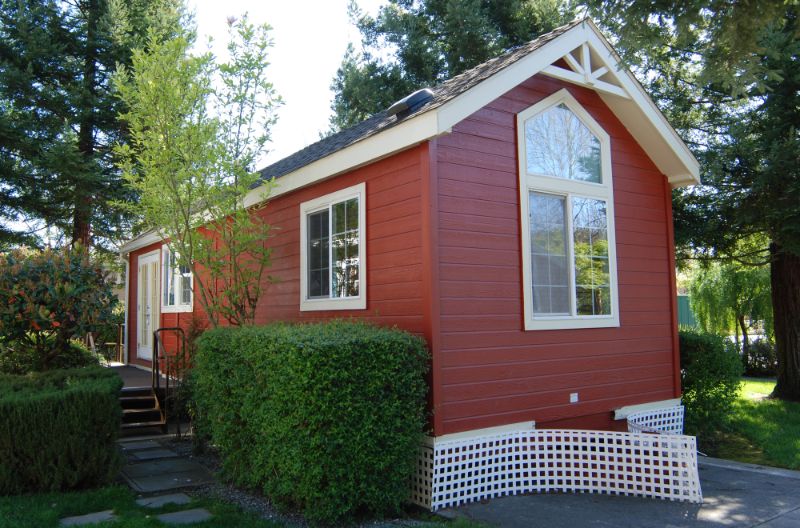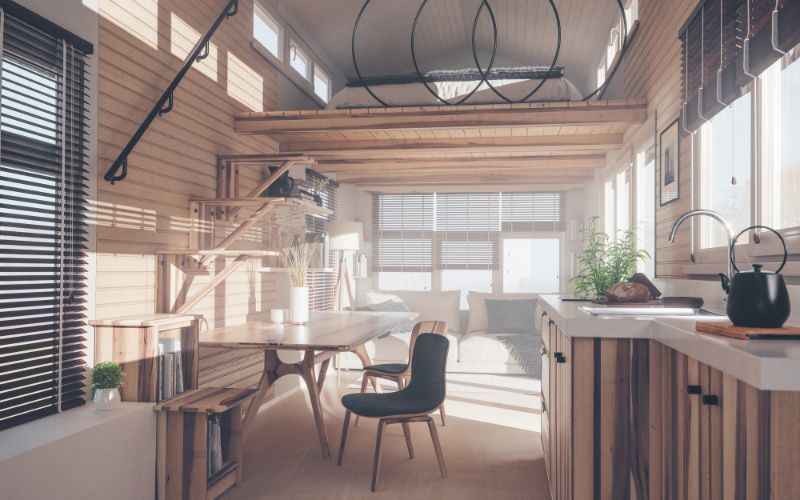In recent years, the tiny house pod movement has gained considerable momentum, prompting a growing number of families to downsize their living spaces. But is this shift towards minimalistic living right for you and your family? This guide delves into the world of tiny homes, exploring the benefits, challenges, and practicalities to help you make an informed decision.

From financial advantages to space constraints, we’ll examine all facets to assist you in determining whether a tiny home is the perfect fit for your family’s lifestyle. While it can be tempting to idolize the minimalist lifestyle, it’s essential to consider all factors before making such a significant change. If you want a simpler, more sustainable life, then the tiny home movement may be precisely what you’ve been searching for.
Financial Implications of Living in a Tiny Home
One of the most significant advantages of tiny home living is the potential for financial savings. Downsizing to a smaller space can substantially cut down on mortgage payments or rent, utility costs, and home maintenance expenses. For many families, the economic freedom provided by a tiny home, allowing for less financial stress and more discretionary income, is a huge draw.
However, it’s essential to remember that the initial cost of building or buying a tiny home can be high, especially if you’re opting for a custom-built one. Additionally, costs associated with land, permits, and zoning can add up. However, the professionals from Clever Tiny Homes suggest that a tiny house on wheels offers a high-quality feel without high prices.
So, while the financial benefits of tiny home living are significant, they should be weighed against the initial investment and recurring expenses. Being able to save money on housing allows for more resources to be invested in other areas of your family’s life, such as travel or education.
Practical Considerations for Tiny Home Living
Aside from the financial implications, there are several practical factors to consider before moving into a tiny home with your family.
One significant aspect to think about is space. Depending on the size of your family and lifestyle preferences, living in a tiny home can require creative organization and downsizing of possessions. This adjustment may be challenging for some family members, especially children who may be used to having more space and possessions.
It’s crucial to have open discussions with your family about what they’re willing to part with and how they envision living in a tiny home.
Another important consideration is zoning regulations and building codes in your area. Local laws can vary significantly, and not all areas allow for permanent residence in tiny homes. You should research and understand the regulations in your city or state before committing to a tiny home lifestyle.
Additionally, mobility and access to utilities may also be limited in certain locations, which can impact livability for families with young children or those with special needs.
Finding Community and Support
While living in a tiny home can be rewarding, it can also feel isolating at times, especially if you’re the only tiny homeowner in your area. That’s why it’s crucial to connect with others who are also living in tiny homes, whether through online forums or local meetups.
Building relationships with individuals and families who share a similar lifestyle can provide valuable support and resources for navigating the challenges that come with tiny home living. It can also be a great way to learn from other’s experiences and share tips and advice.
Even more so, the tiny home movement is often associated with sustainability and a desire for a more environmentally friendly lifestyle. So, connecting with like-minded individuals can also promote community initiatives and encourage sustainable practices within your local area.

The Emotional Journey of Tiny Home Living
Embracing the tiny home lifestyle is not just a physical or financial transition, but an emotional journey as well. It requires a shift in mindset, from the traditional notion of ‘bigger is better’ to embracing minimalism and simplicity. There may be moments of doubt and resistance, particularly during the initial downsizing phase. However, the satisfaction of leading a less cluttered, more intentional life often outweighs these challenges. T
his lifestyle can instill a profound appreciation for the essentials, teaching valuable lessons about contentment and gratitude for what you have. It’s essential to keep an open mind and remain patient with yourself and your family members during the transition. Remember, every family’s tiny home journey is unique – there’s no one-size-fits-all ‘right’ way to do it.
Is a Tiny Home Right for Your Family?
Ultimately, the decision to move into a tiny home with your family is a personal one that requires careful consideration and research. While it can offer financial benefits and promote sustainable living, it’s essential to weigh all practicalities and potential challenges before making the jump. With proper planning, open communication, and a strong support system, the tiny home movement can be a fulfilling and enriching experience for you and your family.
Whether it’s a long-term lifestyle or a temporary adventure, embracing minimalistic living can open up new possibilities and create lasting memories for your family. So, is a tiny home right for your family? Only you can decide. But, as with any significant life change, it’s crucial to approach it with an open mind and a willingness to adapt and grow.
In conclusion, living in a tiny home presents a unique blend of opportunities and challenges. It offers a path towards financial freedom, sustainability, and minimalism, while also necessitating significant lifestyle adjustments and detailed planning. Opting for tiny living can be a rewarding journey, filled with growth, learning, and unforgettable experiences. However, the decision should be approached with comprehensive research, preparation, and frank family discussions to ensure it’s a good fit.
Remember, the tiny home lifestyle isn’t just about the size of your space; it’s about redefining your values and lifestyle, advocating simplicity, and embracing the joy of less. Regardless of your choice, exploring the idea of tiny living can certainly provide a fresh perspective on what ‘home’ means to you and your family.
